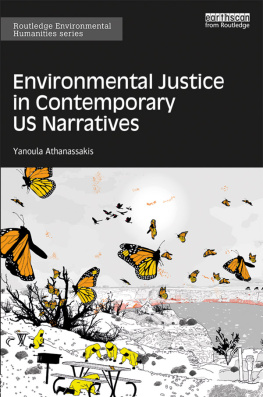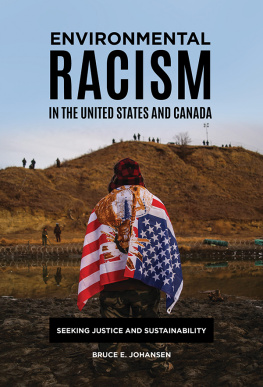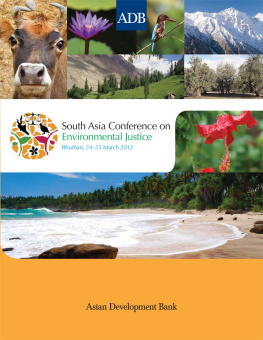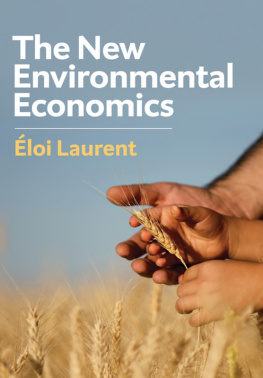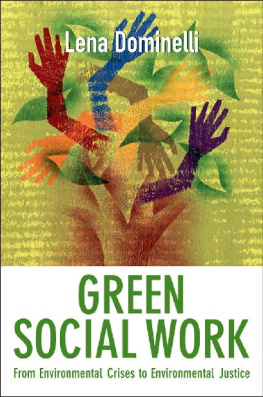Environmental Justice in Contemporary US Narratives
Environmental Justice in Contemporary US Narratives examines post-1929 US artistic interrogations of environmental disruption. Tracing themes of pollution, marine life, and agricultural production in the work of a number of historically significant writers including John Steinbeck, Ruth Ozeki, and Cherre Moraga, this book outlines a series of incisive dialogues on transnational flows of capital and environmental justice. Texts ranging from The Grapes of Wrath (1939) to Body Toxic (2001) represent the body as vulnerable to a host of environmental risks. They identify natural disasters not just as environmental hazards and catastrophes, but also as events intertwined with socioeconomic issues.
With careful textual analysis, Athanassakis shows how twentieth- and twenty-first-century US writers have sought to rethink traditional understandings of how the human being relates to ecological phenomena. Their work, and this study, offer new modes of creative engagement with environmental degradation engagement that is proactive, ambivalent, and even playful.
This book contributes to vital discussions about the importance of literature for social justice movements, food studies, ecocriticism, and the environmental humanities. The core argument of the book is that artistically imaginative narratives of environmental disturbance can help humans contend with ostensibly uncontrollable, drastic planetary changes.
Yanoula Athanassakis received her PhD in English (American literature), with a global studies emphasis, from the University of California at Santa Barbara, USA. She is Co-Founder of the Environmental Humanities Series at New York University (NYU) and Assistant Vice Provost for Academic Affairs, NYU, USA.
Routledge Environmental Humanities
Series editors: Iain McCalman and Libby Robin
Editorial Board
Christina Alt, St Andrews University, UK
Alison Bashford, University of Cambridge, UK
Peter Coates, University of Bristol, UK
Thom van Dooren, University of New South Wales, Australia
Georgina Endfield, University of Nottingham, UK
Jodi Frawley, University of Sydney, Australia
Andrea Gaynor, The University of Western Australia, Australia
Tom Lynch, University of Nebraska, Lincoln, USA
Jennifer Newell, American Museum of Natural History, New York, USA
Simon Pooley, Imperial College London, UK
Sandra Swart, Stellenbosch University, South Africa
Ann Waltner, University of Minnesota, USA
Paul Warde, University of East Anglia, UK
Jessica Weir, University of Western Sydney, Australia
International Advisory Board
William Beinart, University of Oxford, UK
Sarah Buie, Clark University, USA
Jane Carruthers, University of South Africa, Pretoria, South Africa
Dipesh Chakrabarty, University of Chicago, USA
Paul Holm, Trinity College, Dublin, Republic of Ireland
Shen Hou, Renmin University of China, Beijing, China
Rob Nixon, Princeton University, Princeton NJ, USA
Pauline Phemister, Institute of Advanced Studies in the Humanities, University of Edinburgh, UK
Deborah Bird Rose, University of New South Wales, Sydney, Australia
Sverker Sorlin, KTH Environmental Humanities Laboratory, Royal Institute of Technology, Stockholm, Sweden
Helmuth Trischler, Deutsches Museum, Munich, and Co-Director, Rachel Carson Centre, Ludwig-Maxilimilians-Universitt, Germany
Mary Evelyn Tucker, Yale University, USA
Kirsten Wehner, National Museum of Australia, Canberra, Australia
The Routledge Environmental Humanities series is an original and inspiring venture recognising that todays world agricultural and water crises, ocean pollution and resource depletion, global warming from greenhouse gases, urban sprawl, overpopulation, food insecurity and environmental justice are all crises of culture.
The reality of understanding and finding adaptive solutions to our present and future environmental challenges has shifted the epicenter of environmental studies away from an exclusively scientific and technological framework to one that depends on the human-focused disciplines and ideas of the humanities and allied social sciences.
We thus welcome book proposals from all humanities and social sciences disciplines for an inclusive and interdisciplinary series. We favour manuscripts aimed at an international readership and written in a lively and accessible style. The readership comprises scholars and students from the humanities and social sciences and thoughtful readers concerned about the human dimensions of environmental change.
Environmental Justice in Contemporary US Narratives
Yanoula Athanassakis

First published 2017
by Routledge
2 Park Square, Milton Park, Abingdon, Oxon OX14 4RN
and by Routledge
711 Third Avenue, New York, NY 10017
Routledge is an imprint of the Taylor & Francis Group, an informa business
2017 Yanoula Athanassakis
The right of Yanoula Athanassakis to be identified as author of this work has been asserted by her in accordance with sections 77 and 78 of the Copyright, Designs and Patents Act 1988.
All rights reserved. No part of this book may be reprinted or reproduced or utilised in any form or by any electronic, mechanical, or other means, now known or hereafter invented, including photocopying and recording, or in any information storage or retrieval system, without permission in writing from the publishers.
Trademark notice: Product or corporate names may be trademarks or registered trademarks, and are used only for identification and explanation without intent to infringe.
British Library Cataloguing-in-Publication Data
A catalogue record for this book is available from the British Library
Library of Congress Cataloging-in-Publication Data
A catalog record for this book has been requested
ISBN: 978-1-138-89039-8 (hbk)
ISBN: 978-1-315-71244-4 (ebk)
Typeset in Bembo
by Apex CoVantage, LLC
For Anne and Apostolos
Athanassakis expands our understanding of environmental justice through her brilliant engagements with the power of imaginative witnessing, social movements, and biological citizenship. Her book creates essential bridgework between issues as wide-ranging as immigration, industrial agriculture, not-so-natural disasters, and cellular mutation. This ambitious, persuasive work will have a transformative impact across a range of fields, including the environmental humanities, transnational American studies, gender and ethnic studies, immigrant studies, food studies, trauma studies, biopolitics, and animal studies.
Rob Nixon, author of Slow Violence and the Environmentalism of the Poor
Environmental Justice in Contemporary US Narratives dives into the lively, sometimes contentious debates surrounding ecocriticism, American studies, and media studies to make sense of their entangled intellectual roots. From John Steinbeck to Karen Tei Yamashita, Athanassakis brilliantly reads environmental justice fictions about food production, laboring bodies, citizenship, and globalization, for what they tell us about ecological destruction inherent in rampant markedly American global capitalism. The result is a richly satisfying, and much needed, recalibration of our understanding of the major contributions of transnational American studies to the fast rising field of the environmental humanities.

